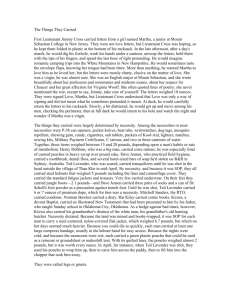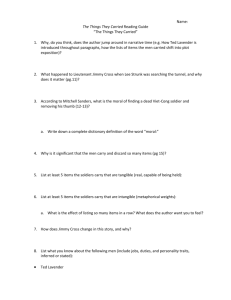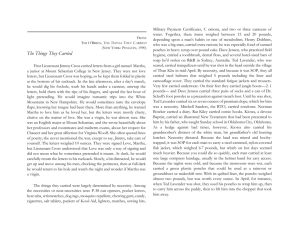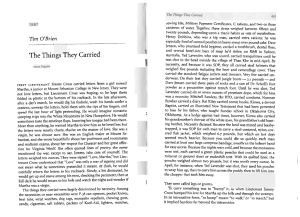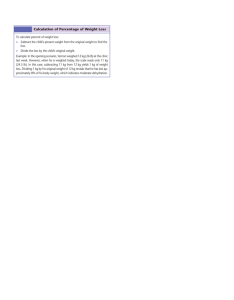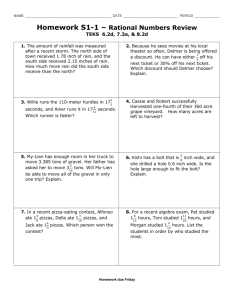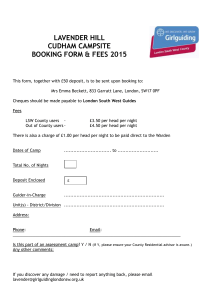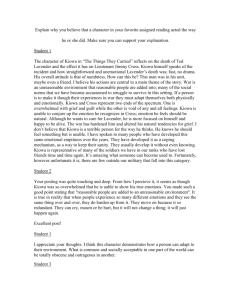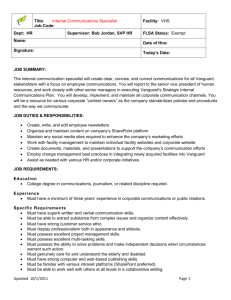Excerpts from “The Things They Carried” by Tim O`Brien: In the first
advertisement
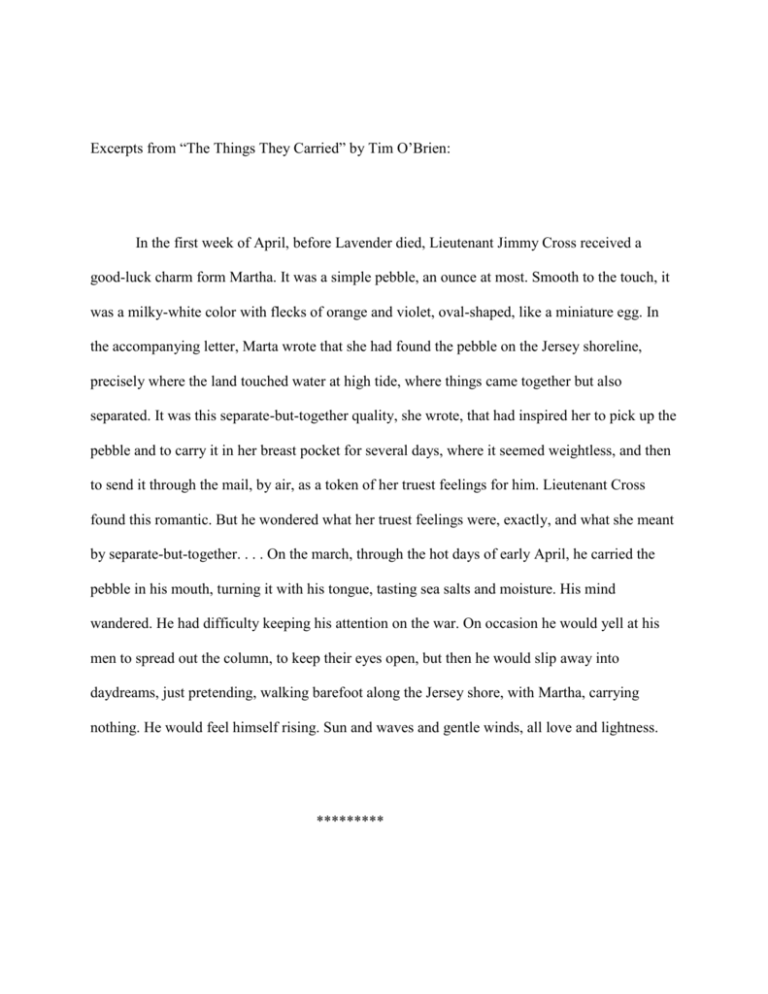
Excerpts from “The Things They Carried” by Tim O’Brien: In the first week of April, before Lavender died, Lieutenant Jimmy Cross received a good-luck charm form Martha. It was a simple pebble, an ounce at most. Smooth to the touch, it was a milky-white color with flecks of orange and violet, oval-shaped, like a miniature egg. In the accompanying letter, Marta wrote that she had found the pebble on the Jersey shoreline, precisely where the land touched water at high tide, where things came together but also separated. It was this separate-but-together quality, she wrote, that had inspired her to pick up the pebble and to carry it in her breast pocket for several days, where it seemed weightless, and then to send it through the mail, by air, as a token of her truest feelings for him. Lieutenant Cross found this romantic. But he wondered what her truest feelings were, exactly, and what she meant by separate-but-together. . . . On the march, through the hot days of early April, he carried the pebble in his mouth, turning it with his tongue, tasting sea salts and moisture. His mind wandered. He had difficulty keeping his attention on the war. On occasion he would yell at his men to spread out the column, to keep their eyes open, but then he would slip away into daydreams, just pretending, walking barefoot along the Jersey shore, with Martha, carrying nothing. He would feel himself rising. Sun and waves and gentle winds, all love and lightness. ********* The things they carried were largely determined by necessity. Among the necessities or near necessities were P-38 can openers, pocket knives, heat tabs, wrist watches, dog tags, mosquito repellent, chewing gum, candy, cigarettes, salt tablets, packets of Kool-Aid, lighters, matches, sewing kits, Military Payment Certificates, C rations, and two or three canteens of water. Together, these items weighed between fifteen and twenty pounds, depending upon a man’s habits or rate of metabolism. Henry Dobbins, who was a big man, carried extra rations; he was especially fond of canned peaches in heavy syrup over pound cake. Dave Jensen, who practiced field hygiene, carried a toothbrush, dental floss, and several hotel-size bars of soap he’d stolen on R&R in Sydney, Australia. Ted Lavender, who was scared, carried tranquilizers until he was shot in the head outside the village of Than Khe in mid-April. By necessity, because it was SOP, they all carried steel helmets that weighed five pounds including the liner and camouflage cover. They carried the standard fatigue jackets and trousers. Very few carried underwear. On their feet they carried jungle boots—2.1 pounds—and Dave Jensen carried three pairs of socks and a can of Dr. Scholl’s foot powder as a precaution against trench foot. Until he was shot, Ted Lavender carried six or seven ounces of premium dope, which for him was a necessity. Mitchell Sanders, the RTO, carried condoms. Norman Bowker carried a diary. Rat Kiley carried comic books. Kiowa, a devout Baptist, carried an illustrated New Testament that had been presented to him by his father, who taught Sunday school in Oklahoma City, Oklahoma. As a hedge against bad times, however, Kiowa also carried his grandmother’s distrust of the white man, his grandfather’s old hunting hatchet. Necessity dictated. ******* On ambush, or other night missions, they carried peculiar little odds and ends. Kiowa always took along his New Testament and a pair of moccasins for silence. Dave Jensen carried night-sight vitamins high in carotin. Lee Strunk carried his slingshot; ammo, he claimed, would never be a problem. Rat Kiley carried brandy and M&M’s. Until he was shot, Ted Lavender carried the starlight scope, which weighed 6.3 pounds with its aluminum carrying case. Henry Dobbins carried his girlfriend’s panty-hose wrapped around his neck as a comforter. They all carried ghosts. ******** Mitchell Sanders carried a set of starched tiger fatigues for special occasions. Henry Dobbins carried Black Flag insecticide. Dave Jensen carried empty sandbags that could be filled at night for added protection. Lee Strunk carried tanning lotion. Some things they carried in common. Taking turns, they carried the big PRC-77 scrambler radio, which weighed thirty pounds with its battery. They shared the weight of memory. They took up what others could no longer bear. Often, they carried each other, the wounded or weak. They carried infections. They carried chess sets, basketballs, Vietnamese-English dictionaries, insignia of rank, Bronze Stars and Purple Hearts, plastic cards imprinted with the Code of Conduct. They carried diseases, among them malaria and dysentery. They carried lice and ringworm, and leeches and paddy algae and various rots and molds. They carried the land itself—Vietnam, the place, the soil—a powdery orange-red dust that covered their boots and fatigues and faces. They carried the sky. The whole atmosphere, they carried it, the humidity, the monsoons, the stink of fungus and decay, all of it, they carried gravity. ********* They carried all the emotional baggage of men who might die. Grief, terror, love, longing—these were the intangibles, but the intangibles had their own mass and specific gravity, they had tangible weight. They carried shameful memories. They carried the common secret of cowardice barely restrained, the instinct to run or freeze or hide, and in many respects this was the heaviest burden of all, for it could never be put down, it required perfect balance and perfect posture. They carried their reputations. They carried the soldier’s greatest fear, which was the fear of blushing. Men killed, and died, because they were embarrassed not to. It was what had brought them to the war in the first place, nothing positive, no dreams of glory or honor, just to avoid the blush of dishonor. They died so as not to die of embarrassment.
